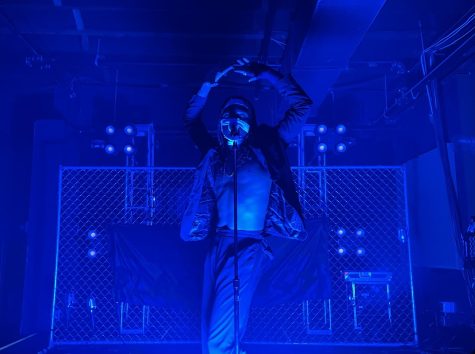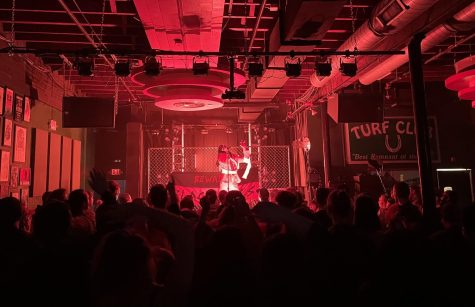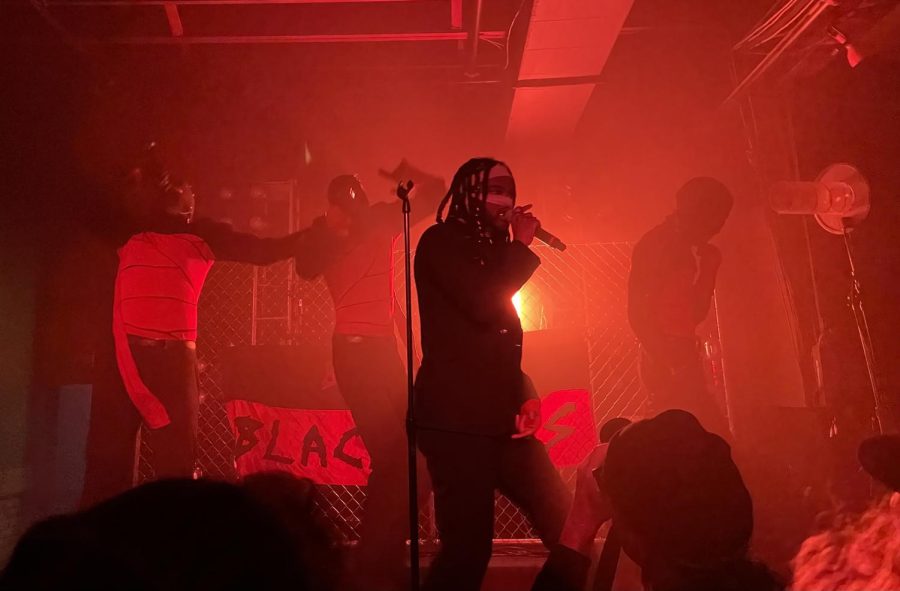Under the foggy haze of Turf Club’s pink and white lights glazing over draft beer and vodka soda-sipping guests, the music lover’s haven was preparing to welcome a first-time visiting musician to its gated stage. After entering one of Saint Paul’s staple venues and having a horseshoe shaped stamp pressed onto my right wrist, it was clear that the crowd was ready for Kofi Owusu-Ansah, the Ghanaian-Australian genre-bending rapper and singer known as Genesis Owusu.
After winning best hip-hop release, best independent release, best cover art and album of the year at the 2021 ARIA Awards in Australia for “Smiling with No Teeth,” Owusu has been wowing funk, punk and indie fans ever since. After releasing his alternatively spoken-word infused hip-hop narrative, “Cardrive EP” in 2017 followed by his groovy singles “Wit’ Da Team” in 2018, “Good Times” and “Simmer Down” in 2019 and a trail of singles from “Smiling With No Teeth” in 2020, Owusu steadily became the focus of Australia-based fans, and has made a name for himself across the pond.
Filled with floral shirts- and cowboy boot-wearing girls sifting through the leather jacket and man-bun rocking 20-somethings, the crowd waited eagerly in the dim fog of Turf Club’s dance floor. As stagehands hustled from one side of the stage to the other, plugging in and unplugging this and that, their movements were watched by the older side of the crowd meandering around the bar, both groups equally as different as they were ready to see the performance.

March 28 marked Owusu’s fifth stop on his “Smiling with No Teeth” debut U.S. album tour, but the energy cascading off of the medical gauze and gold chain covered musician proved the talent and aesthetic of a seasoned performer. With floodlights, face masks and banners reading “Beware: black dogs” and “Don’t forget to smile,” Owusu’s performance journeyed through themes of racism, depression, renewal and forgiveness — all of the emotions embedded in his critically-acclaimed debut album.
Owusu began his show by welcoming the Twin Cities local producer and singer, Obi Original. The Nigerian artist brought an hour of Afro-fusion, Nigerian funkadelic rock and acoustic covers of songs from his “WAVES” EP to the ready-to-groove audience. In his neutral black and white outfit, Original’s enthusiastic dance moves and zealous stage presence drew the lingering crowd to the front of the venue, filling the dance floor with anticipation for what was yet to come.
A live concert is a translation of a musician’s art in real time, and Owusu’s performance brought aesthetically coordinated new life to “Smiling with No Teeth.” From hand-crafted red and black costumes to a stage set complete with a gate and floodlights creating the demeanor of a guarded space, the concert crafted a different taste to the musician’s jaunty and raw tunes.
Before entering the stage, Owusu’s “On the Move!” blasted through the speakers, bright white light flashing the audience with each bump of bass. The electronically energetic beat left the audience with palpable anticipation jetting from the center to each corner of the room, the bass shaking the framed concert posters hanging on the far left wall of the venue.
As three dancers made their way on stage with a banner reading “Beware: Black Dog,” — their faces completely covered with black ski masks and bodies as stiff as organized soldiers — a menacing red and black fusion of foggy light filled the venue. In his new album, several of Owusu’s songs include depictions of “black dogs,” a metaphor representing racism and depression in Owusu’s everyday life.
“As a child, I started writing with short stories that transitioned to poetry and then to music,” Owusu explained in an interview with one of YouTube’s popular music critics, Anthony Fantano. “The storytelling flair came out of my youth and I thought of [the black dogs] as a creative, fresh approach to dealing with these topics of depression and racism.”
Time and time again, the image of “black dogs” overlapped with each song. In lyrics, in spoken word interludes and written on banners, “black dogs” seemed to be circling the Turf Club’s barrier. As the deep drum line of “What Do I Fear?” rang out overhead, Owusu sauntered on stage with his arms raised above his gold-infused dreads as audience members screamed the lyrics to the 90s-inspired rock tune.

The dancers swarmed around Owusu, their moves pulling at him as he roared into “Black Dogs!” The rough grit of the song’s guitar line and slicing lyrics formed a tantalizing expression of the meaning behind the music. As Owusu sped up, slowed down and reversed the beat, the light faded into a purple glow and by the end of the two songs, every member of the audience cheered with anticipation.
Lightening the mood, Owusu’s 2019 Michael Jackson-esq single “WUTD” rang out from the speakers. Its playful tone transitioned effortlessly into the calming spoken word intro sounds of “Waitin’ on Ya,” its bouncing rhythm and sing-songy vocals sliding around the room with ease. At the end of the song, Owusu’s grill-covered smile gleamed as he tore off the medical gauze covering his face — each new rip releasing one of the “black dogs” he had hiding behind the lyrics of his earlier songs.
As confidently as his first step on stage, the child-like melody of “Don’t Need You” washed over the stage and the audience responded to his alluring dance moves immediately. Owusu began with a monologue circling to the “black dogs” before bursting into the hypnotizing chorus.
Followed by a surprise appearance of “Crank That (Soulja Boy),” the blissfully lighthearted sounds of “A Song About Fishing” and the summertime-worthy warmth of “No Looking Back,” Owusu’s Saint Paul debut articulated facing racism, depression, growth and renewal through an aesthetically captivating and genre-defying performance expected from a seasoned performer, and perfected by Owusu’s debut album tour.



















